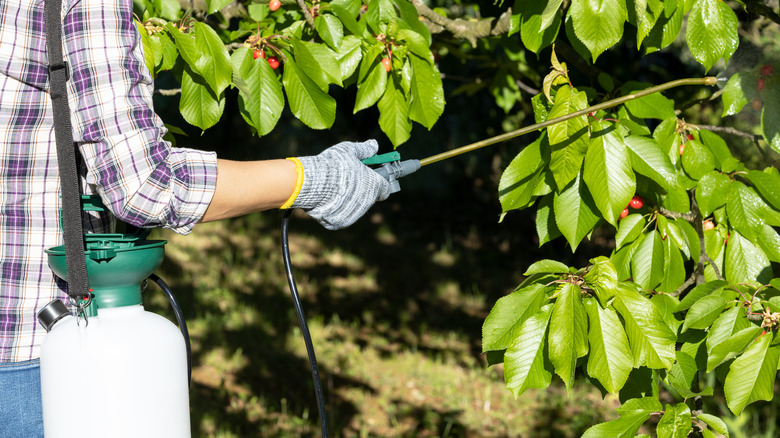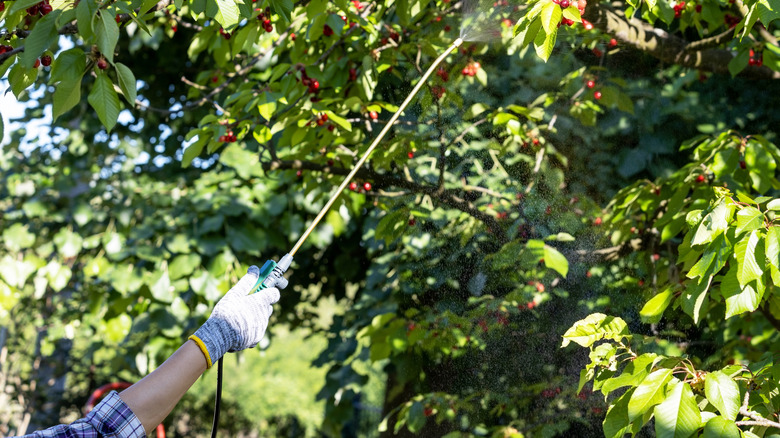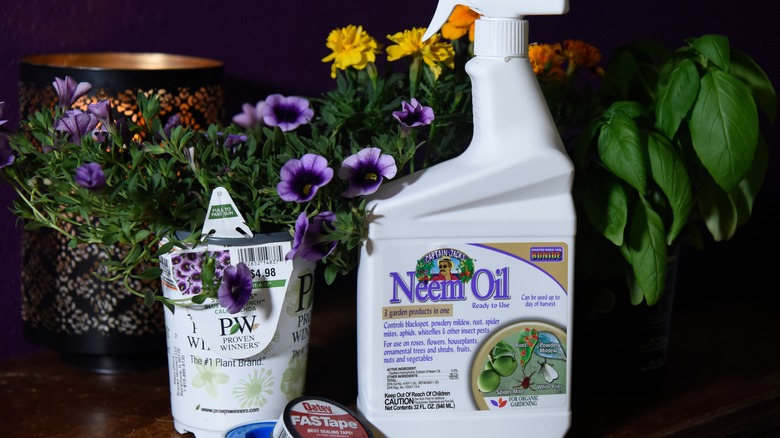An Essential Guide To Using Horticultural Oil Vs Neem Oil In The Garden
An ecologically-balanced garden will always have pests, but sometimes they spiral out of control, and you have to step in to mitigate the problem. Many gardeners turn to horticultural oils since they're generally safer than pesticides. There are many types of oils, and it helps to know what's what before you buy them. If you've ever wondered what neem oil is and if it's the same as horticultural oil, the simple answer is yes. Horticultural oil is a category, and neem is a type. However, there's a type of neem oil that can be used as a pesticide to kill pests on contact, while other horticultural oils work best as preventative measures.
Horticultural and neem oils can be used in several ways in the garden. The most common method for both is to spray them on plants to prevent insects from hatching or growing. However, there are a few different types of oils that have to be used during certain parts of the year, so it's important to understand how to use them correctly.
Using horticultural oil in the garden
Horticultural oils can be used to prevent diseases and ward off or control pests. Many of these oils are made with petroleum and are called mineral oils, but there are plant-based options like soybean, neem, and cottonseed oils. Cottonseed oil is believed to be the best pesticide option as far as plant-based oils go, while soybean oil is good for mites. As you shop for horticultural oil, consider what you need them for and find the option that best suits your needs.
Horticultural oils, both mineral and plant-based, can be sprayed directly on plants. They pose very few risks to people and the environment, so they're considered safe to use in most cases. When treating powdery mildew, spray the oil on both sides of the leaves and on the stems as soon as you see the disease to stop the spread. When used for pest control, they can be sprayed directly on soft-bodied insects to suffocate them. There are different kinds of horticultural oils, and it matters which one you choose. Dormant oils should be used while plants are dormant in winter because they can damage leaves. Summer, supreme, and superior oils are highly refined and can be used on leaves and in summer.
Using neem oil in the garden
Neem oil is a simple, natural solution for many pests, including mites, aphids, and other insects. It's a type of plant-based horticultural oil that is made from neem tree seeds. The oil is often a shade of yellow or brown and smells close to sulfur or garlic. It's not the most appealing, but as far as pesticides go, it's certainly safe to use around plants. It works best when sprayed on immature pests, like soft-bodied insects that are in the larval stage. Like other horticultural oils, neem oil will suffocate them and kill them.
Neem oil has a few bonus uses that other oils can't provide. The oil naturally contains azadirachtin, a component that acts as an insecticide. This will repel many insects, so spraying it on your plants regularly can reduce populations simply by keeping the bugs away. Azadirachtin also messes with insect hormones and stops insects from being able to eat, grow, and lay eggs as intended, thus ending the circle of life and killing the local pest population. Not every neem oil contains azadirachtin, so be sure to read labels carefully.
It should be noted that horticultural and neem oils don't discriminate and may cause harm to beneficial pollinators. Follow the directions for the product you purchase and spray when pollinators aren't buzzing around the garden to reduce casualties.


